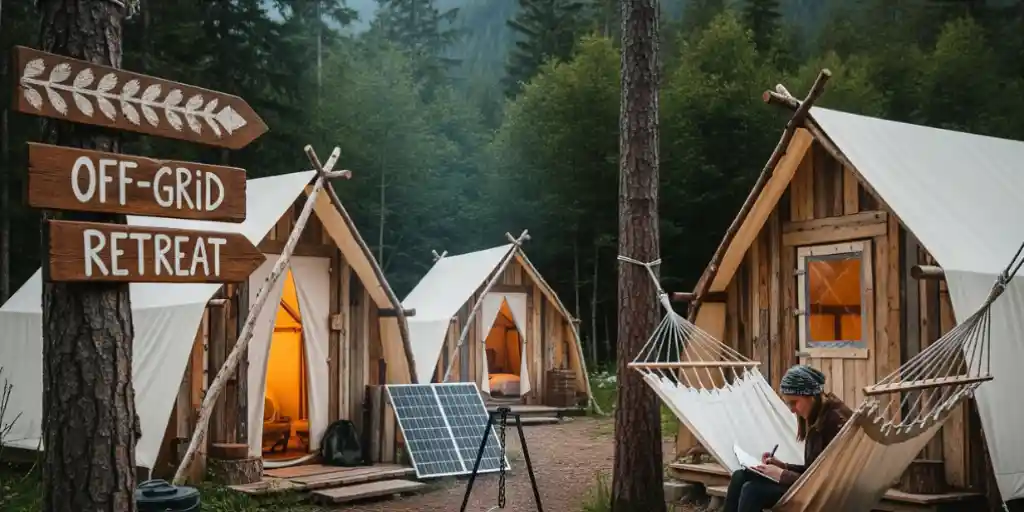Dreaming of starry nights, peaceful woods, and a digital detox—but tired of crowded campgrounds and noisy RV parks? Whether you're a nature-lover, van-lifer, or weekend explorer, off-the-grid eco campsites are the ultimate way to reconnect with the earth without harming it.
In this blog, we’ll uncover the hidden gems of eco-camping and share the smartest ways to find small, low-impact campsites that keep you close to nature and far from the crowds. From booking tricks to zero-waste tips, here’s how to find your next unplugged paradise.
🔍 What Are Off-the-Grid Eco Campsites?
These campsites are often:
-
Run by locals, not big companies
-
Limited to a few tents or small campers
-
Solar-powered or water-conserving
-
Free from Wi-Fi, generators, or concrete pads
-
Located in forests, deserts, coastlines, or wild reserves
They offer peace, privacy, and sustainability—but are harder to find.
💡 Why Choose Eco Campsites Off the Grid?
Unlike commercial campgrounds, these sites:
-
Protect nature with minimal infrastructure
-
Support small communities or landowners
-
Offer silence and seclusion
-
Let you enjoy dark skies and wild sounds
-
Reduce your carbon footprint while traveling
So yes—you camp better and lighter.
✈️ Common Challenges with Finding Eco Campsites
| Problem | Why It Happens | Solution |
| Too many people in national parks | Overhyped and overcrowded spots | Look for private or community-run eco sites |
| No signal to search online | Remote locations = no internet | Download offline maps and apps in advance |
| Lack of listings on booking sites | Small sites avoid big platforms | Use niche directories or word of mouth |
| Unclear rules on land use | Not all wild camping is legal | Check apps with land ownership info |
🛡️ Top Tricks to Discover Hidden Eco Campsites
Here are smart and sustainable hacks that digital minimalists, hikers, and vanlifers use to uncover perfect off-grid escapes.
1. ✅ Use Alternative Camping Platforms
Why it matters: Airbnb and Booking.com miss the hidden gems.
Eco Camping Hack:
-
Try Hipcamp, iOverlander, Sekr, or Campspace for offbeat listings.
-
Look for “eco,” “permaculture,” or “low-impact” tags.
2. 🗺️ Search on Offline Maps + Topo Apps
The trap: You lose GPS or signal once you're remote.
Why it’s limiting:
-
You can’t find or confirm campsites on the go.
Camping Trick:
-
Download offline maps via Gaia GPS, Maps.me, or AllTrails.
-
Mark potential sites in advance.
3. 🏕️ Tap Into Local Networks or Ask Rangers
Problem: Small eco camps don’t advertise widely.
Why it matters:
-
Locals and forest rangers know the best secret spots.
Eco Tip:
-
Ask at local nature centers, co-ops, or organic cafes.
-
Join FB groups like “Eco Camping Community” or “Low Impact Travelers.”
4. 🔌 Look for Solar or Compost-Enabled Camps
Why it matters: True eco-sites run on renewables and natural systems.
Eco Camping Trick:
-
Choose sites with solar panels, rainwater catchment, or compost toilets.
-
Many list these features under “eco amenities.”
5. 🧭 Use Public Land Tools for Dispersed Camping
Problem: Legal wild camping is hard to confirm.
Why it’s risky:
-
Trespassing can lead to fines or conflict.
Camping Trick:
-
In the US, use USFS (Forest Service) and BLM land maps.
-
In Europe, try Park4Night or Landvergnügen (Germany).
-
Check national park websites for backcountry zones.
6. 🧳 Pack for Leave-No-Trace Travel
Why it matters: Eco camping is about more than location—it’s how you act.
Eco Hack:
-
Use a solar lantern instead of a generator.
-
Carry reusable utensils, trash bags, biodegradable soap.
-
Use a trowel to bury waste if there’s no toilet.
💳 Best Platforms to Discover Off-Grid Eco Campsites in 2025
| Platform/App | Region Focus | Best For |
| Hipcamp | USA, Australia | Private eco sites & farm stays |
| iOverlander | Global | Dispersed & remote free spots |
| Campspace | Europe | Small sustainable campgrounds |
| Gaia GPS | Global | Terrain + land ownership overlays |
| The Dyrt | USA | Off-grid, backcountry options |
🔍 Real User Example
“I found a tiny eco camp in rural Portugal with solar showers and zero Wi-Fi. It wasn’t on Google—but Campspace helped me find it. It was the most peaceful three days I’ve had in years.” – Marta, Nature Photographer
🧠 Pro Tips to Remember
-
Always book or mark campsites before losing signal
-
Carry paper backups of map coordinates
-
Respect land rules—ask permission where unsure
-
Pack in, pack out—leave nothing behind
-
Prioritize camps with renewable energy or local ownership
💬 Final Thoughts: Camp Small, Live Big
The best campsites don’t have Wi-Fi—they have wildlife. By choosing small eco sites and off-grid options, you protect nature while experiencing it more deeply.
✅ Don’t just camp—camp consciously.
✅ Don’t just escape—escape responsibly.
✅ Don’t just sleep under stars—wake up to purpose.
Your next off-grid haven is out there—quiet, clean, and waiting.
📌 FAQs About Off-the-Grid Eco Camping
Q1. Are off-grid eco sites safe?
Yes—if well-prepared and mapped. Always inform someone of your location.
Q2. Can I charge devices at these campsites?
Some have solar chargers. Bring a power bank or solar panel as backup.
Q3. Are pets allowed at small eco camps?
Varies. Always ask the host or check listing rules.
Q4. What should I bring for zero-waste camping?
Reusable containers, compostable soap, bamboo utensils, cloth towels, and trash bags.
